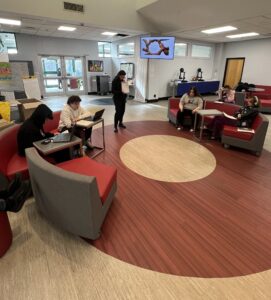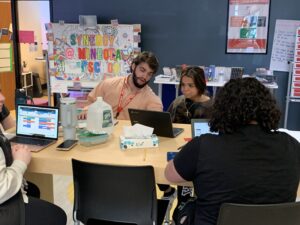Take a moment and ask yourself, “How did I get into education?” Was it a teacher who inspired you when you were in school? Was it a last-second decision? Or, chances are one of your parents was a teacher or was involved in K12 education in some way. The latter circumstance is why many adults are in their chosen profession. But when it comes to Gen Z, that’s far less likely to happen.
This generation of students is all about forging their own futures. How can they not be? Technology is evolving faster than ever before and the job market of 2024 is vastly different than it was 30-plus years ago. That’s why Mike Nagler, superintendent of the Mineola Union Free School District in New York, is giving students every opportunity to receive career-based education and experience before graduating high school.
The vision
Nagler’s son is currently a senior in a neighboring district and class valedictorian. Despite excelling academically, he tells his father, “I hate school.”
“What do you mean you hate school?” Nagler asks.
“I don’t understand why I have to learn what they want me to learn,” his son replies. “I want to learn what I want to learn.”
Then, the lightbulb went off in Nagler’s head. Even if students are doing well in school, are they actually happy with the education they’re receiving? So, he created Synergy, a program where students can take classes asynchronously while pursuing career-based educational experiences.
“I thought, ‘Why don’t we take the coursework and put it in the cloud and take a seven-hour day and tell the kids, ‘You design your day,'” says Nagler.
Interestingly enough, the school occupies what was once a bank. But its wide-open space on the “floor” of the building makes it perfect for collaboration, including individual rooms lined across its perimeter that students can reserve to meet virtually with teachers and work on assignments.

In retrospect, he says it’s very similar to the college experience. However, there’s more structure in place to support students.
The district has a partnership with Cisco, a networking, cloud and cybersecurity solutions company, that allows administrators like Nagler to track all sorts of student data, including how much time students spend on a particular subject and how often they meet with a teacher.
“They own the space, the time and the pace,” he says. “I have kids now… social studies is a year-long course. They crank through it. They’re almost done. That frees up time for them to go explore stuff they want to explore.”
For instance, Synergy often hosts seminars for students interested in a particular field or subject area. Students also have the opportunity to meet virtually with experts in any given profession who volunteer their time to pour into that student.

“The heart of the whole concept is that we understand the things you have to do and the things you want to do,” he explains. “How do we create a bridge for you to do both?”
At the front of the school, also, is a coffee shop where students can work during the school day and make money, thanks to the beauty of asynchronous learning.
“If you want to work a three-hour shift, go right ahead,” says Nagler.
Sounds like a pretty sweet gig if you’re a high school student, right? It’s a lot of freedom the district is awarding its students, but Nagler says there are policies in place to ensure students stay on track with their coursework.
While coursework is asynchronous and accessible via “the cloud,” students are required to physically attend school. Teachers—who are also on site—are given office hours to monitor students’ activity and progress, so if a student isn’t on top of their work, that teacher then steps in.
Creating future-focused educational experiences
“I think this generation [of students] is very different,” Nagler explains. “Previous generations became their parents, and I don’t think this generation is going to do that.”
He adds that educators are obligated to prepare kids for a life of success beyond high school.

“That weighs on me because I don’t think we’re doing that,” he argues. “In many respects, if you’re not going to college, I don’t know what a high school diploma is doing for you. And I think we can do better. We can offer certifications, we can offer different opportunities for kids to leverage their time and make money in the economy they’re going into.”
Above all, Nagler says he’s committed to his pursuit to educate the next generation of students by equipping them with the tools to design their individual path to success.
“It’s really a shift from content to skills that the state’s not ready for, but the world is,” he explains.

